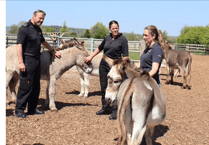Campaigner Lindy Hingley spent decades highlighting the plight of dolphins and whales, denouncing their needless deaths and campaigning for closer monitoring of fishing activity off the coasts of Devon. These magnificent creatures found a stalwart ally in her, until ill-health forced her to retreat to land for good. RICHARD TORNÉ spoke to her at her home near Dartmouth.
“I hope you don’t mind, but I have to keep moving, otherwise the pain becomes unbearable,” she says apologetically.
Taking short steps, she cuts a frail figure in her dressing gown, and at first glance it’s hard to imagine that Lindy Hingley was once an intrepid campaigner who braved rough seas aboard a large fishing trawler, or that she actually sat alone on a cold, deserted beach until nightfall, guarding over the body of a dead dolphin before dragging it with a rope and driving it all the way across to London, just so that experts at London Zoo could perform an autopsy.
Yet, this is exactly what she did until she was struck down with Parkinson’s in 2016 after already being diagnosed with multiple sclerosis.
“Up until then I was as fit as a fiddle. You can imagine (what it’s like) for someone who loves being outdoors all the time. If you really wanted to ruin my life you’d take the dolphins away.”
She guides me gingerly to the sitting room, which now doubles as a bedroom as she can no longer walk upstairs. Tables, chairs and a sofa are covered with books, papers and assorted objects - there isn’t a square inch to sit on, so I plant myself on the floor with a cushion to conduct the interview.
Photos of dolphins leaping over the waves, or – disturbingly – in death, evincing terrible injuries, are the first things I gaze upon. In the middle of it all are two snapshots of a young woman, binoculars in hand, staring purposefully at the camera.
Lindy founded the Brixham Sea Watch association in 1990 after she started going out on regular trips on her then husband’s trawler – the Jacoba. That in itself is a notable achievement as she never learnt to swim, not that she was unduly bothered.
“The first thing that worried me was the amount of live fish that got kicked out the scupper doors. They’d laugh at me because I used to run around chucking things back into the sea.”
The bemused fishermen had to explain to Lindy the futility of her gesture - however well intentioned - as the fish had no chance of survival after having burst their swim bladder from surfacing too quickly.
That was only a taster, and what started off as a fun activity quickly turned into something of a nightmare as the realisation of what happens to bycatch quickly dawned on her, describing the sight as a “floating abattoir”.
The appearance of dolphins and whales came as a welcome relief, and would soon give her a new purpose in life. “I wanted to find out what was happening to dolphins in the UK, but mainly along the Channel. Initially, I had an idea of a ‘sighting scheme’ for fishermen to let us know if they saw any cetaceans.”
Despite warnings from her husband John that she was wasting her time - “fishermen are already sick of having to fill in forms” – she ploughed on.
Lindy went round all the fishing boats in the area, getting to know the crews and handing out forms. She then got in touch with a marine expert at Oxford University, who ran the Sea Watch Foundation.
Despite having low expectations, the scheme took off. Information on cetacean sightings began pouring in, but much to Lindy’s surprise her involvement with local fishermen was more than just about obtaining raw data.
“These were tough, 15-pints-a-night guys. I had one guy in particular, a trawler skipper who was always fighting in pubs, phone me in tears because of what he saw.”
It turns out that not even a hardened old sea dog is immune to the sight of a large pod of pilot whales majestically roaming the sea, quietly following the boat “like a herd of buffalo”.
In Lindy’s case, it was staring straight into the eye of a dolphin as it rode the surf next to the ship’s bow that did it. “That always got to me,” she says tearfully.
Her reports caught the interest of the National Coastwatch Institution, among others, as well as an increasing number of scientists, who got in touch with Lindy’s association.
She quickly learnt about pelagic fish and pair trawling, which involves two fishing boats simultaneously towing a large net, and the devastating impact this has on sea mammals.
“I watched some of the autopsies (showing) that they break their own backs in an effort to get out of the net. It wasn’t just one or two but whole family groups, including babies. These are highly sophisticated animals in the way they look after each other. It can take them up to 20 minutes to die.”
To illustrate the point, she compares that scene to taking a herd of sheep into an abattoir and “terrifying the absolute s**t out of them” for the same length of time before killing them.
Despite the government setting aside a budget for post mortems, Lindy claims there was little interest from the scientific community in dealing with the dead cetaceans that were being washed up.
“Scientists are very clever and they could do so much, but they don’t. They just sit on stuff - what’s the point of that?”
Being devil’s advocate, I suggest that a scientist’s role is essentially to compile data and report their findings.
“They were doing a nine-to-five job,” she waves dismissively. “This was about massive suffering on a massive scale.”
Her frustration is evident to this day, and she is equally disdainful of the many NGOs tasked with protecting wildlife (“they have these meetings in London, sitting around talking about how sad it is that these dolphins are dying, then they b****r off and nothing ever happens.”)
Undeterred, she and a small team of volunteers decided to load up dolphin carcasses in her own car and drive them up to London Zoo themselves for the post mortem examinations.
“The volume of dead animals was absolutely shocking around the late 1980s,” she remembers.
She believes her campaign influenced the decision by the government to introduce fisheries observers on fishing boats. What they uncovered was pretty horrific.
They found that on average groups of 20 to 30 dolphins were being caught every other haul, and that the dead dolphins were mostly the healthiest and fittest, not the sickly animals they had come to expect.
“You were losing the alpha males and breeding females because quite often they were the ones that had the energy, the strength and the inquisitiveness to go into the trawls.”
The injuries that were inflicted on these animals as they battled to free themselves in their 20-minute long struggle is easy to imagine.
She describes the number of dead dolphins as “off the scale”, with up to 10,000 in one winter alone. And for every one dead on the beach, “there could be 10 more at sea”, she adds.
She has more uplifting tales, though, and compares groups of young male dolphins to naughty, 14-year-old teenagers, who playfully nip at each other while “going off on a rampage”.
She also tearily recounts the story of a “perfect baby dolphin” she found on the beach. “They’re like human babies, they only drink their mother’s milk for eight months,” pointing out that their survival is virtually impossible if they lose their mother.
One particular episode left an indelible mark. It was the sight of a “beautiful pregnant female” in the middle of a desolate beach shortly before nightfall on a cold and wet winter’s day. As she sat waiting for a farmer to drive his tractor up the beach and haul the body away, she thought aloud: “I will not let you die in vain.”
Her passion and determination to protect these creatures threatened to spill over into an open confrontation with fishermen. She concluded that French and Scottish fishermen were doing most of the damage at the time. Despite this, Lindy is surprisingly sympathetic.
“It’s a very hard job being a fisherman, but they’re special people and even though they don’t make a fuss about these things they love seeing these animals.”
She found a ready ally in Elliot Morley, who was Fisheries Minister for a time under Tony Blair’s Labour government, until his involvement in the parliamentary expenses scandal and subsequent conviction forced him out of politics in 2009-2010.
Losing such an important ally was significant, particularly as Lindy began receiving threats from disgruntled fishermen and her place as a campaigner came under increasing scrutiny from some of the big wildlife associations, some of whom viewed her as little more than an interloper.
Fortunately for her, she came under the radar of big TV shows, including Newsnight and Richard & Judy. Major news dailies such as The Times and The Daily Mail were also eager to interview this swashbuckling young woman, who was happy to take on all comers to defend her aquatic friends.
The feedback from the TV programmes was predictably huge. “I had people...old ladies, coming up to me and offering to give me £5.”
In a way, it was inevitable that the campaign would eventually run out of steam, however. “It reached a zenith,” she says in a matter-of-fact way.
Running a large fishing trawler on a day-to-day basis became prohibitively expensive, especially with an annual fuel bill of £133,000, so the Jacoba was eventually sold.
Her husband ruefully commented that the dolphin deaths would reduce drastically, anyway, if not come to an end, simply because of overfishing. “‘It’ll all be sorted because they’ll just fish out the bass’, he said, and they did,” she remarks.
Her concern now is that as she is no longer on the front line there might be insufficient data on reported cetacean sightings. Her fears are not unfounded. In 2020, the Devon Wildlife Trust issued an appeal to help a Plymouth researcher to record the fortunes of the South West’s “only resident pod of bottlenose dolphins”, which were down to 28 when the article was published.
Sonar and pollution are undoubted killers, but as far as Lindy is concerned the fishing industry remains the biggest threat to cetaceans.
Official data would seem to back her claims.
According to a recent report by scientific researchers at Frontiers, bycatch is responsible for the “greatest current source of human-caused deaths of marine mammals worldwide”. Up to 40 per cent of the fish that is caught is bycatch and partly thrown back into the sea, either dead or dying, an EU report also found recently - that’s millions of tonnes of animals that are being regularly discarded.
Lindy is equally critical of certain traditions, namely those that result in the massacre of whales and dolphins in the Faroe Islands and Japan. “It’s OK for me to club something to death because it’s tradition,” she says mockingly, “what a load of b******s!”
She may well have the public on her side on this issue, at least, which is just as well.
Today many sea mammal species are in steep decline across the planet. According to the latest data from the International Union for Conservation of Nature (IUCN) up to 17 cetacean species are on the ‘critically endangered’ or ‘endangered’ list, while 32 subspecies are in a similar position. A further 17 species are in a ‘vulnerable’ or ‘near vulnerable’ state.
But it’s not all bad news. A record number of whales, dolphins and seals were spotted in UK waters in 2019, according to the Wildlife Trust, including rare sightings of bottlenose dolphins off the Yorkshire coast.
And even now, wildlife associations and official bodies seek Lindy’s counsel on all things cetacean. Her experience and knowledge mattered, after all.
“We made a tiny bit of change - we cared. I’m sure there are probably fishermen who think I’m a meddling old bag, but I think there are a hell of a lot more fishermen who I seemed to get on my side.”
There’s also a message for the younger generation of would be campaigners.
“It’s great that you’re going around picking up all the plastic from the beaches, but don’t forget what is happening out to sea.”





Comments
This article has no comments yet. Be the first to leave a comment.